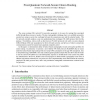Free Online Productivity Tools
i2Speak
i2Symbol
i2OCR
iTex2Img
iWeb2Print
iWeb2Shot
i2Type
iPdf2Split
iPdf2Merge
i2Bopomofo
i2Arabic
i2Style
i2Image
i2PDF
iLatex2Rtf
Sci2ools
ACNS
2015
Springer
2015
Springer
Post-Quantum Forward-Secure Onion Routing - (Future Anonymity in Today's Budget)
The onion routing (OR) network Tor provides anonymity to its users by routing their encrypted traffic through three proxies (or nodes). The key cryptographic challenge, here, is to establish symmetric session keys using a secure key exchange between the anonymous user and the selected nodes. The Tor network currently employs a one-way authenticated key exchange (1W-AKE) protocol ntor for this purpose. Nevertheless, ntor as well as other known 1W-AKE protocols rely solely on some classical Diffie-Hellman (DH) type assumptions for their (forward) security, and privacy of today’s anonymous communication cannot be ensured once quantum computers arrive. In this paper, we demonstrate utility of lattice-based cryptography towards solving this problem for onion routing. In particular, we present a novel hybrid 1W-AKE protocol (HybridOR) that is secure under the lattice-based ring learning with error (ring-LWE) assumption or the gap DH assumption. Due to its hybrid design, HybridOR is not ...
ACNS 2015 | Cryptology |
| Added | 13 Apr 2016 |
| Updated | 13 Apr 2016 |
| Type | Journal |
| Year | 2015 |
| Where | ACNS |
| Authors | Satrajit Ghosh, Aniket Kate |
Comments (0)

